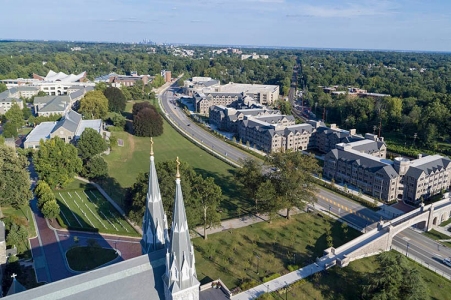Villanova University Geoscientists Host Philadelphia High School Students Through National Science Foundation Urban Environmental Contamination Grant

Thanks to a three-year grant from the National Science Foundation (NSF), faculty members from Villanova University’s College of Liberal Arts and Sciences hosted students from Walter B. Saul High School located in West Philadelphia for an environmental justice-based learning experience designed to promote diversity and begin a pipeline of attracting local students to geoscience careers.
Steven Goldsmith, PhD, associate professor, geography and the environment; Kabindra Shakya, PhD, associate professor, geography and the environment; and Vanessa Boschi, PhD, assistant research professor, chemistry; organized the summer program and helped participating students conduct research on air, water and soil contamination. Lisa Marco-Bujosa, PhD, assistant professor, education and counseling, also assisted with designing modules and assessments for the newly developed program. The collaborative effort also included Villanova undergraduate and graduate students who served as peer mentors and helped design course modules.
“The geosciences have historically been underrepresented by minority groups,” Dr. Shakya said. “We built an immersive program that provides hands-on experience to monitor air, water and soil pollution in the local community for high school students in Philadelphia.”
Saul High School, despite it’s urban location, is the largest agricultural farm school in the United States , with specialties in career and technical education programs rooted in hands-on learning. These offerings teach principles of biology and chemistry, and graduates have used their skills to address environmental and agricultural changes throughout the Philadelphia area and beyond.
As part of the NSF grant, Saul students conducted field research to investigate air quality and pollutants, and measured samples of water and soil with professional-grade scientific instruments in Morris Park and along Cobb’s Creek in West Philadelphia. The students recorded their findings and were then able to evaluate the impact of pollution in areas within the city and compare it to locations expanding outward. The session concluded with presentations detailing their results.
“[The pollution] directly impacts where they live, where they go to school and where they hang out,” Dr. Boschi said. “They completely understood the implications of the research they were doing and the value of the information they were learning.”
During their stay at the University, the participants were also greeted by members of Philadelphia’s Environmental Justice Advisory Commission, alongside local environmental professionals, who spoke about their careers in remediating environmental contamination and advancing environmental justice in the region.
“Our professional development series featured a diverse panel of Philadelphia-centered experts speaking to the importance of both lived experience and professional efforts to redress environmental harm, furthering student aspiration and awareness of geoscience,” said Dr. Goldsmith.
As part of their on-campus experience, Saul School students also had the opportunity to meet with members of the University admissions staff to learn more about the process of applying to colleges as well as potential financial aid and scholarship programs.
This NSF grant is solely dedicated to this program, which supports Villanova’s mission of committing to the discovery and application of knowledge for learners who seek to nurture a concern for the common good. This was the first summer session under the grant, with a goal to expand the number of high school participants in 2024. The research team also hopes to form a relationship that encourages diversity and post-secondary opportunities in geoscience fields.
“Our goal is to build a long-term partnership with Saul High School that will provide a pathway for underrepresented students to geoscience programs throughout the region, including Villanova’s own environmental science major,” mentioned Dr. Goldsmith. “A more diverse regional workforce will result in increased community perspective when tackling issues of urban environmental remediation and increased public perception of geoscience as a profession to tackle these issues.”
